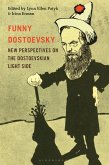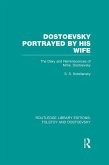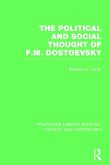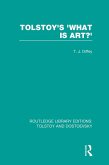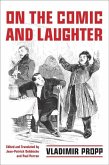Tapping into the emergence of scholarly comedy studies since the 2000s, this collection brings new perspectives to bear on the Dostoevskian light side.
Funny Dostoevksy demonstrates how and why Dostoevsky is one of the most humorous 19th-century authors, even as he plumbs the depths of the human psyche and the darkest facets of European modernity. The authors go beyond the more traditional categories of humor, such as satire, parody, and the carnivalesque, to apply unique lenses to their readings of Dostoevsky. These include cinematic slapstick and the body in Crime and Punishment, the affective turn and hilarious (and deadly) impatience in Demons, and ontological jokes in Notes from Underground and The Idiot.
The authors - (coincidentally?) all women, including some of the most established scholars in the field alongside up-and-comers - address gender and the marginalization of comedy, culminating in a chapter on Dostoevsky's "funny and furious" women, and explore the intersections of gender and humor in literary and culture studies.
Funny Dostoevksy applies some of the latest findings on humor and laughter to his writing, while comparative chapters bring Dostoevsky's humor into conjunction with other popular works, such as Chaplin's Modern Times and Lin-Manuel Miranda's Hamilton. Written with a verve and wit that Dostoevsky would appreciate, this boldly original volume illuminates how humor and comedy in his works operate as vehicles of deconstruction, pleasure, play, and transcendence.
Funny Dostoevksy demonstrates how and why Dostoevsky is one of the most humorous 19th-century authors, even as he plumbs the depths of the human psyche and the darkest facets of European modernity. The authors go beyond the more traditional categories of humor, such as satire, parody, and the carnivalesque, to apply unique lenses to their readings of Dostoevsky. These include cinematic slapstick and the body in Crime and Punishment, the affective turn and hilarious (and deadly) impatience in Demons, and ontological jokes in Notes from Underground and The Idiot.
The authors - (coincidentally?) all women, including some of the most established scholars in the field alongside up-and-comers - address gender and the marginalization of comedy, culminating in a chapter on Dostoevsky's "funny and furious" women, and explore the intersections of gender and humor in literary and culture studies.
Funny Dostoevksy applies some of the latest findings on humor and laughter to his writing, while comparative chapters bring Dostoevsky's humor into conjunction with other popular works, such as Chaplin's Modern Times and Lin-Manuel Miranda's Hamilton. Written with a verve and wit that Dostoevsky would appreciate, this boldly original volume illuminates how humor and comedy in his works operate as vehicles of deconstruction, pleasure, play, and transcendence.



